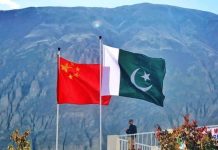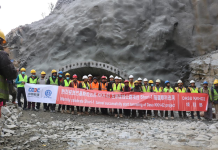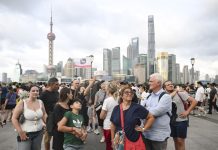Bangladeshi teenager Alifa Chin was born on the Chinese naval hospital ship Peace Ark in November 2010.
At the time, her mother Jannatul Ferdou was eight months pregnant and had been diagnosed with a serious heart problem. Ferdou told Xinhua News Agency that local hospitals did not have the ultra modern medical facilities necessary to deal with her condition.
As the Peace Ark was visiting Chittagong, a major port city in Bangladesh, to provide free medical services to local people, Ferdou’s doctors turned to their counterparts on the ship for help. Shortly after a joint consultation, Chinese doctors performed a cesarean section on Ferdou. “After the operation, both my daughter and I were healthy,” she said.
Her husband Anwar Hossain decided to name the baby girl Chin, after the word for China in the Bengali language, as a token of their gratitude. The girl’s bond with China continued when she reunited with the Chinese medical staff during Peace Ark’s visits to Bangladesh in 2013 and again in 2017. She also traveled to China in 2019.
In a letter she recently wrote to Chinese President Xi Jinping, Chin said she wants to study medicine in China in order to save others’ lives, just as her “Chinese mother”—who helped with her mother’s delivery—had done. In a reply to Chin’s letter, Xi encouraged her to study hard, pursue her dream and carry forward the traditional friendship between the two countries.

The Peace Ark is a purpose-built hospital ship equipped with cutting-edge medical devices. Since it entered into service in 2008, the vessel has visited 43 countries and regions during its 10 overseas missions and provided medical services to more than 250,000 people.
This is just one of the touching stories that have come from 60 years of Chinese doctors offering medical assistance overseas. So far, China has dispatched around 30,000 medical personnel to 76 countries and regions across five continents, with a primary focus on Africa, providing 290 million diagnoses and treatments for local people, according to the National Health Commission of China (NHC).
In February, in a reply letter to the 19th Chinese medical team dispatched to the Central African Republic, Xi said “the Chinese people love peace and cherish lives, which is vividly illustrated by their efforts in international medical assistance.”

China’s commitment
After many African countries gained independence from European colonial powers, they urgently needed to develop their medical infrastructure and healthcare systems. In 1963, at the invitation of the Algerian Government, China sent a medical team abroad for the very first time. The members set out from Beijing on April 6, 1963, traveled for 10 days through Moscow, Belgrade in Yugoslavia and Rabat in Morocco, and finally arrived in the Algerian city of Saida.
“At that time, apart from the members of the Chinese medical team, the area had only one doctor and one nurse,” Xue Jin, an 86-year-old doctor from Hubei Province, who went to Saida in 1965, recalled.
The mission in Algeria marked the official beginning of the country’s organized, large-scale and continuous international medical assistance, Ma Xiaowei, Minister of the NHC, wrote recently in China’s most widely circulated newspaper People’s Daily. Since then, Chinese doctors have been working in Africa, offering much-needed medical assistance and services to the locals.
Li Furong, a senior ophthalmologist and the head of the 26th Chinese medical team to Benin in 2022, said she has developed deep feelings for the country after participating in medical assistance to the West African nation three times over the last two decades.
The doctor, from the First People’s Hospital of Yinchuan, Ningxia Hui Autonomous Region, previously worked in Benin in 2002 and 2016. Since 1978, Ningxia has sent 616 medical workers to Benin based on a protocol signed between the two sides.
Li said many Beninese people think of Chinese doctors as their most trusted friends. “I’ve been touched by their words after receiving treatment, such as ‘Ami, merci, merci! Super, les médecins chinois (Thank you, my friend. Chinese doctors are great)’,” she told Ningxia Daily.
Making use of their wide range of expertise, medical teams from Ningxia have performed around 100,000 operations and saved millions of lives. In addition to treating patients, they help train local medical workers and teach them how to use advanced medical technology.

Ultrasound doctor Wu Yilun, at Xi’an Honghui Hospital in Shaanxi Province, has also completed three separate two-year stints in Sudan. Over the past 21 years, three other members of his family, including his uncle, sister and brother-in-law, have also provided medical assistance in Sudan.
“For me, joining medical teams to Africa is not only a family legacy but also our mission and obligation as doctors,” he told Xinhua.
Shen Ali, an anesthesiologist at Ying Cheng Chinese Medicine Hospital in Hubei Province, followed in the footsteps of his grandfather and uncle to join the Chinese medical team to Algeria in 2015.
Through a relay between father and son, husband and wife, as well as family members working hand in hand, Chinese doctors have been passing on the baton of the assistance mission from one generation to the next.
When the Ebola outbreak struck West Africa in 2014, Chinese medical teams were there to aid in the fight against the disease. When COVID-19 was raging around the world and hitting the most vulnerable African countries, similarly, Chinese doctors were sent to help fight the pandemic.
During the pandemic, China launched its largest global emergency humanitarian campaign in 70 years, sending 38 expert teams to 34 countries and providing more than 2.2 billion doses of vaccines to over 120 countries and international organizations, Ma said.
At present, Chinese medical assistance teams continue to work at 115 medical sites in 56 countries around the world, nearly half of which are in remote areas with harsh conditions, Foreign Ministry spokesperson Mao Ning said on May 29.

Filling gaps
China is the only country in the world that has provided assistance to other developing countries by dispatching medical teams on a continuous and large-scale basis, setting an example in the history of medical and health cooperation, Ma said.
Chinese doctors’ efforts span not only diagnoses and treatments but also pioneer surgeries to help bridge the medical gaps in the host countries.
In Sudan, the Chinese medical team conducted the first open-heart surgery in 1977 at the China-Sudan Abu Osher Friendship Hospital, former head of the hospital Mohamadain Hussein told Xinhua. The Sudanese girl who received the surgery is now a mother of five.
In December 2022, Li Yang, a cardiologist from the First Hospital of China Medical University in Shenyang, Liaoning Province, and a member of the Chinese medical team to The Gambia, finished the first cardiac pacemaker implantation operation in the history of the country for an 82-year-old patient.
Du Bingbing, head of the current Chinese medical team to Tanzania, conducted a laparoscopic radical operation for congenital hypertrophic pyloric stenosis, which causes obstructions in the digestive tract, on a one-week-old baby. That was the first minimally invasive laparoscopic surgery conducted in the East African country.
Many of these “firsts” have been recorded in host countries. Moreover, through clinical teaching, academic exchanges, lectures, as well as remote guidance, Chinese medical teams have established cooperative relations with hospitals in many countries, supported them in establishing key specialized centers, filled technical gaps and improved the overall medical conditions.
So far, China has established cooperation initiatives with 46 hospitals in 41 countries and regions, and jointly built 25 key clinical specialty centers, according to the NHC.

In July 2018, Wang Yong, then Director of the Medical Department of Beijing Shijitan Hospital, led a medical team to Burkina Faso on an assistance mission, after the two countries had resumed diplomatic relations in May that year. The team included nine internal and surgical experts and one burn specialist.
Burkina Faso is a landlocked country on the upper reaches of the Volta River in West Africa. The scarcity of medical resources has long been a headache for the country, which had only one doctor for every 30,000 people and one hospital bed for every 1,823 people. The main task of the medical team was to help local hospitals train medical staff and update their medical equipment within a period of six months.
In one local hospital, members of the medical team taught hand over hand to show the trainees medical skills in the most direct and clear way, Wang told Beijing Daily.
Many of the Chinese medical teams have received commendations from the governments of host countries for their contributions. For example, in May, a Chinese medical team was awarded the National Order of Merit, Cooperation and Development Medal by President Umaro Sissoco Embalo of Guinea-Bissau, and the traditional Chinese medicine (TCM) anti-COVID team from China was awarded the Knight Medal of the Kingdom of Cambodia by the Cambodian Ministry of Health.

A community of health for all
The dispatch of Chinese medical teams to foreign countries is one of China’s assistance programs with the longest duration, the largest scale and the best results, and is well received by the governments and people of the relevant countries, Ma said.
“China provided timely medical help when there was a severe lack of medical personnel in African countries after the colonial period more than half a century ago,” Nasser Bouchiba, President of the Africa-China Cooperation Association for Development in Morocco, told Xinhua.
Chinese doctors usually work in remote areas with harsh conditions, playing “a significant humanitarian role” in helping improve local healthcare, Bouchiba said, adding that the continued dispatching of medical teams to Africa over the past six decades is the best illustration of China’s internationalism and its role as a responsible major country.
In March 2020, Xi first proposed building a global community of health for all in a message to French President Emmanuel Macron. When delivering a speech via video link at the Global Health Summit in May 2021, Xi reiterated his vision for pursuing and achieving this goal.
China will continue to provide assistance to other developing countries and improve the health and wellbeing of people around the world, Mao said.
However, challenges do remain. According to NHC’s Ma, the global health governance system is being reshaped. International medical assistance may become a tool used by certain countries for major-power competition, creating difficulties for conducting cooperation and coordination in the health field.
As more developing countries show their willingness to carry out medical cooperation with China, there is a need to make better and more tailored arrangements for the investment of funds, personnel and other resources. China should also further explore the sustainability of its international assistance programs, Ma concluded. –The Daily Mail-Beijing Review news exchange item






